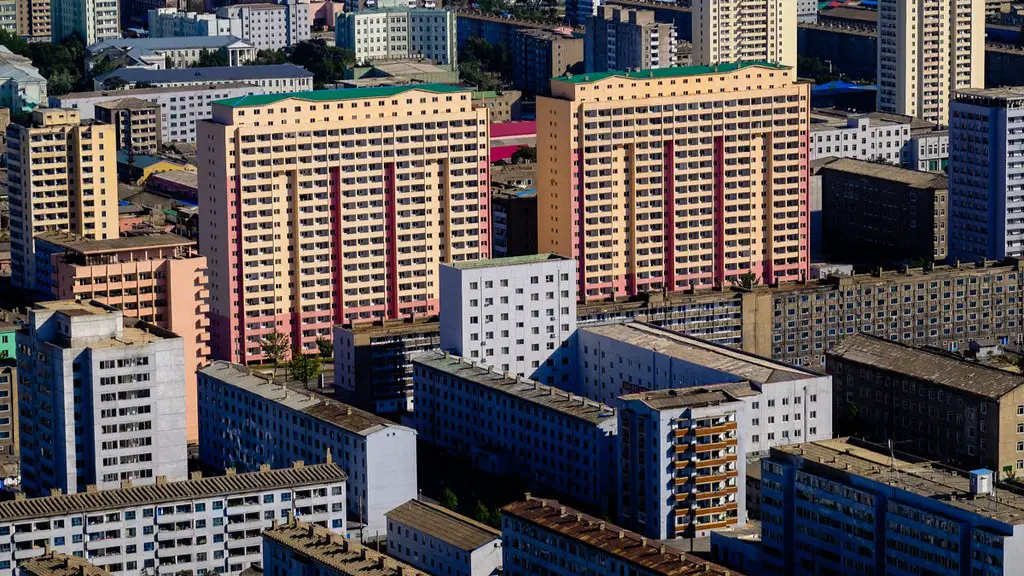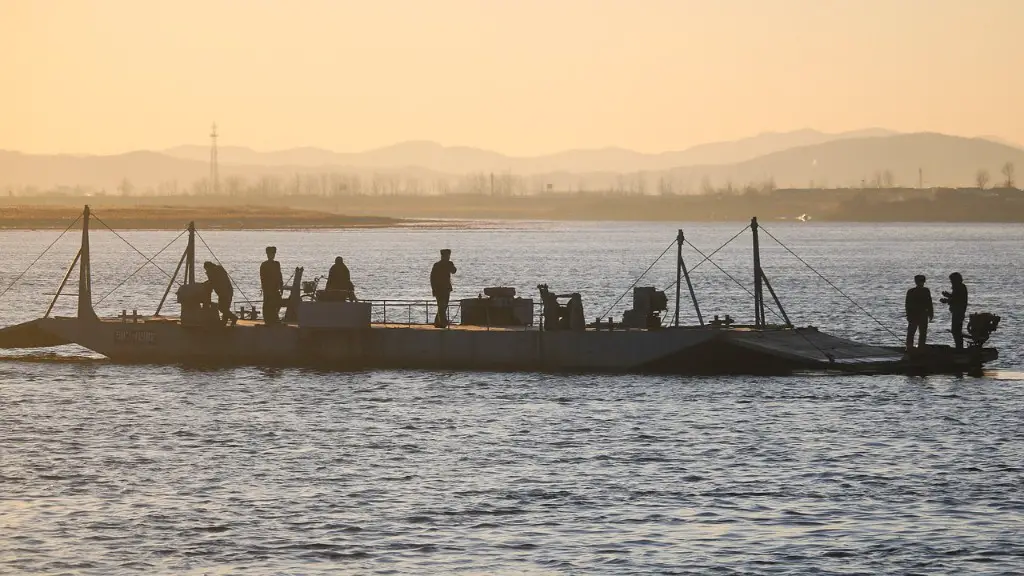North Korea is a nuclear-armed country and one of the most isolated countries in the world. Its policies and politics have had a huge impact on the international community for years. The North Korean people have had to face extreme poverty and food shortages, rigged elections, and a ruthless system of oppression. Its nuclear weapons program has caused global concerns, and its actions towards its neighbours and the United States have put the region at risk and kept tensions high in the Korean peninsula.
Though North Korea is isolated, its actions still heavily influence the world. Its escalating nuclear capabilities have pushed international boundaries, and the international community is being forced to reconsider its strategies on how to best deal with it. Military and economic motives are being questioned, and new, more creative strategies are being put into place. The hermit kingdom also has widespread cyber-warfare operations, which have been linked to major cyber threats all across the world, including the recent ransomware attack that affected computers in more than 150 countries.
The international community has had to seriously contemplate sanctions against North Korea, in an effort to force them to change their policies. Sanctions can be effective means of exerting pressure on other countries, but they could potentially destabilize the region and cause more harm than good. They might also antagonize North Koreans and distract them from more important goals, such as those related to economic development, poverty reduction, and human rights.
International law requires countries to comply with resolutions handed down by the UN Security Council, and in the case of North Korea, sanctions have been implemented several times in the past. This does not always lead to the desired results, as North Korea has proven to be highly resistant to external pressure. It also has close ties to some of the most isolated and oppressive regimes around the world, and it is believed that some of them are providing support for North Korea’s nuclear activities.
The world has also had to grapple with diplomatic efforts aimed at bringing North Korea back to the negotiating table. Negotiations have had some successes, but have at times been hampered by North Korea’s reluctance to engage in meaningful dialogue with the international community. This has made it difficult to find a lasting and peaceful solution to the nuclear crisis, as well as ensure the human rights of the North Korean people.
North Korea’s influence on the world has far-reaching implications, both militarily and politically. Its actions have already caused unprecedented upheaval in the region, and could potentially have serious consequences in other parts of the world. As the situation continues to unfold, it is important that the international community remains united and goes beyond sanctions, towards a comprehensive and constructive solution that will address the underlying causes of the crisis.
The Economy of North Korea
The economy of North Korea is highly centralized and largely a state-run affair. The private sector is limited primarily to farming, and the majority of economic activities are carried out by state-run companies. It is estimated that about 30 percent of the North Korean population is living in poverty, and the country remains largely dependent on aid from its neighbours and from international organizations such as the United Nations. This has posed a challenge for the international community, as it seeks to help the people of North Korea without enabling the government to continue its oppressive policies.
The country’s poor economy has also hampered its ability to make use of nuclear weapons, as it cannot create the necessary resources to build a true nuclear arsenal. This has raised some hope that North Korea will be willing to negotiate in order to gain access to the resources it needs. In addition, North Korea’s closed economy means that it is missing out on the global economy, and is largely disconnected from the rest of theworld.
The international community has sought to improve the economic situation of North Korea through a number of initiatives, such as offering humanitarian aid and supporting economic development in the country. But these efforts have been largely unsuccessful, as North Korea continues to reject aid in order to maintain its isolationist policies. As such, it remains difficult to gauge the impact of North Korea’s economy on the rest of the world.
The Impact of North Korea’s Human Rights Violations
Human rights violations are one of the major areas of concern surrounding North Korea. The country’s government has been accused of widespread abuses, including torture, inhumane prison conditions, forced labor, and restrictions on freedom of speech and assembly. The North Korean people face a range of abuses, from restrictions on basic freedoms to political oppression, and the international community has been increasingly vocal about the need for North Korea to respect human rights and make significant changes to its policies.
The human rights situation in North Korea has the potential to destabilize the entire region, and could possibly lead to a full-scale conflict if the international community does not take action. The lack of justice for North Koreans, combined with the repression and violence meted out by the state, has caused immense suffering for its citizens. This has serious implications for the region, as it could push North Koreans to take drastic measures in order to escape their oppressive lives.
It is clear that the human rights situation in North Korea needs to be addressed. There has been some progress in recent years, but much more needs to be done to ensure the rights of the North Korean people are respected and protected. The international community must press North Korea to make the necessary reforms, and to ensure the human rights of its citizens are not violated further.
North Korea’s Relationships With Its Neighbours
North Korea’s relationships with its neighbours have long been strained, and have grown increasingly hostile in recent years. Its relations with South Korea and Japan have been especially tense due to its nuclear ambitions and missile tests. South Korea and Japan have placed additional sanctions on North Korea in an effort to deter its aggressive actions, while North Korea has blamed them for escalating tensions in the region.
The relationship between North Korea and China has also been strained, though China has been more reluctant to implement economic sanctions and showed more willingness to open dialogue. China is North Korea’s closest ally, and has been attempting to mediate between North Korea and the international community in order to bring about a peaceful solution to the crisis. Despite this, North Korea continues to view China with suspicion and mistrust.
The international community has also sought to use diplomacy to improve North Korea’s relationships with its neighbours. In 2018, North Korea and South Korea held a historic summit in an effort to improve their relationship and reduce tensions. This provided a glimmer of hope for the future, but it remains to be seen if North Korea is truly interested in having cordial relations with its neighbours.
North Korea’s relations with its neighbours remain a crucial factor in determining the future of the region. If left unchecked, North Korea’s aggressive behaviour could cause serious instability and lead to further tensions. The international community must continue its diplomatic efforts in order to bring about a peaceful solution and ensure that North Korea’s relationship with its neighbours is stabilised.
North Korea’s Impact on International Norms
North Korean actions have had far-reaching implications on international norms, as its nuclear and missile programs have raised concerns in the international community. In 2006, North Korea conducted its first nuclear test, a clear violation of international laws and treaties. This was followed by multiple other tests, and the deployment of nuclear weapons, in the face of widespread condemnation from the international community.
In 2017, the United States imposed new sanctions on North Korea in an effort to stop its nuclear ambitions. Despite these efforts, North Korea continues to pursue its nuclear program, and is now believed to possess a variety of nuclear-tipped missiles which could reach as far as the United States mainland. This has prompted theinternational community to rethink its strategies and policies, as they seek to prevent a full-scale nuclear conflict.
North Korea’s disregard for international norms is not just limited to its nuclear program. It has violated numerous other laws and norms, such as those related to human rights, the protection of its citizens, and access to the global economy. These actions have not gone unnoticed, and the international community has sought to curb North Korea’s actions and ensure that it is held accountable for its violations.
North Korea’s disregard for international norms has had a big impact on the international community, as it has been forced to confront a nation that appears to be unconcerned about the consequences of its actions. This has forced the international community to rethink its strategies and policies, and has had a major role in shaping the current international landscape.
North Korea’s Influence on The World’s Media
North Korea’s nuclear ambitions have had a significant impact on the world’s media. Until recently, North Korea had been highly isolated and its domestic policies had been largely neglected by the international community. But its nuclear program has caused a shift in focus, as the international media has started to focus more heavily on North Korea and its policies.
The media coverage of North Korea has also highlighted the conditions faced by its people. Journalists have been able to uncover the truth behind North Korea’s oppressive policies and the human suffering it has caused. This has put more pressure on the international community to address the situation in North Korea and to ensure that its people are not subjected to further abuse and oppression.
The media coverage of North Korea is often sensationalized, and some media outlets go as far as to portray it as an irrational and dangerous state. Despite this, the media does provide an important platform for discussing the situation in North Korea, and for raising awareness about the plight of its people.
North Korea’s nuclear ambitions have undeniably influenced the world’s media, but there remains a need for an objective and balanced media coverage of the country and its policies. The world has a duty to ensure that all of its citizens are treated equally and with respect, and the media can play an important role in this effort.




